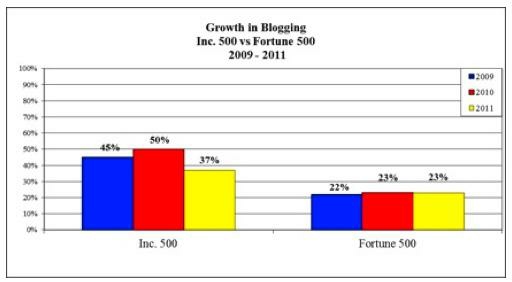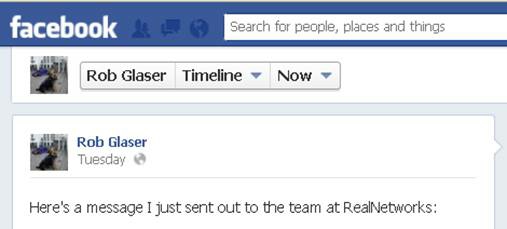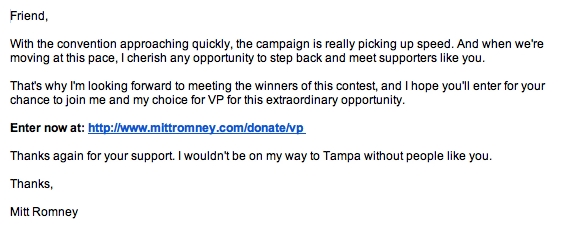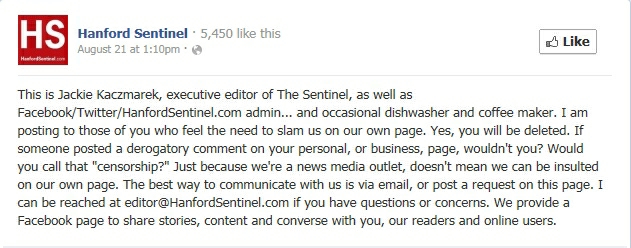Ryanair CEO Says People Who Don't Print Boarding Passes Are "Stupid"
Suzy McLeod was charged €300 because she didn't print five boarding passes for a Ryanair flight. McLeod complained about the charge and received lots of support on Facebook but not from Ryanair. CEO Michael O'Leary responded to her complaint by saying that the woman should pay, "...for being an idiot and failing to comply with her agreement at the time ofbooking. We think Mrs. McLeod should pay 60 euros for being so stupid."
McLeod said that she didn't print the boarding passes for her family because her trip was too long: they were away for 15 days, and the return passes had to be printed within two weeks. O'Leary had little sympathy for her dilemma: "She wasn't able to print her boarding card because, as you know, there are no internet cafes in Alicante, no hotels where they could print them out for you, and you couldn't get to a fax machine so some friend at home can print them and fax them to you."
O'Leary also said, "She wrote to me last week asking for compensation and a gesture of goodwill. To which we have replied, politely but firmly, thank you, Mrs. McLeod, but it was your ****-up."
A spokesperson for Ryanair simply relayed the airline's policy:
"As is clearly outlined in the terms and conditions for every Ryanair passenger, Mrs McLeod agreed at the time of booking that she and her fellow passengers would check in online and print their boarding cards before arriving at their departure airport, and she also accepted and agreed that if she failed to do so then she would pay our boarding card re-issue penalty of £60 per passenger."
On Facebook, McLeod's post received more than 500,00 "likes," but so far, the airline is unrelenting.
O'Leary has a reputation for making inflammatory comments, such as these:
"You're not getting a refund so **** off. We don't want to hear your sob stories. What part of 'no refund' don't you understand?"
"People say the customer is always right, but you know what - they're not. Sometimes they are wrong and they need to be told so."
"Nobody wants to sit beside a really fat ****** on board. We have been frankly astonished at the number of customers who don't only want to tax fat people but torture them."
Discussion Starters:
- Should the company have responded differently to the complaint, or does the policy speak for itself?
- How does this situation fit with Ryanair's status as a discount airline? Are customers justified in being upset, or should they simply comply with the policy?
McDonald's Slips on Communicating with the Hmong
Known for adapting its marketing campaigns to different cultures and countries, McDonald's has missed on at least one advertisement to the Hmong people in St. Paul, Minnesota.
Although the billboard translates roughly to "Coffee gets you up. Breakfast gets you going," locals say the grammar is incorrect, and "It sounds weird in Hmong because we don't really talk like that." A doctor at a St. Paul hospital said, "The text is also wrong, missing key breaks in the language" and "As it stands right now, it doesn't make sense at all."
The doctor also expressed concerns about McDonald's food:
"I think it's great that more mainstream businesses are realizing the buying (and) consumer power of the Hmong community. [But] chronic diseases like diabetes, hypertension and obesity are already a major health concern in the Hmong community. Most of this is attributed to the changing westernized eating behaviors that Hmong people have adapted to. McDonald's should instead focus more on healthy eating."
A representative from Arnold Advertising, which works with McDonald's restaurants in the area, said, "This is the first time that McDonald's anywhere in the country has advertised in Hmong." McDonald's targeted the Hmong people as one consumer group and "wanted to make sure we were communicating effectively with them." With tens of thousands of Hmong living in St. Paul, the area has more Hmong people than any other U.S. city.
In a statement by McDonald's regional marketing director, the company acknowledged that it fell short:
"We strive to reach our guests in relevant ways including the use of in-language messaging. While it was our intention to create a special message for our Hmong population in Minnesota, we now realize that an error was made in the translation of 'Coffee Gets You Up, Breakfast Gets You Going.' It was not our intention to offend anyone, and we apologize for the error. We are working with our local advertising agency to correct these billboards and will re-post next week."
Discussion Starters:
- How could McDonald's have avoided this embarrassing situation?
- The company chose not to respond to the doctor's point about health concerns within the Hmong community. Should McDonald's have included a statement regarding this issue? Why or why not?
Mars: Deep-Fried Bars Are Not "Healthy"
When a Scottish restaurant promoted deep-fried Mars bars, the chocolate maker took issue. The company sent a letter requesting that Carron Fish Bar post a disclaimer about the fried chocolate on its menu: "not authorised or endorsed by Mars Incorporated."
A Mars spokesperson explained the company's position:
"We are really flattered that customers of Carron Fish Bar like our product so much that it has now become a flagship product for the store.
"No application for a protected geographical indication has been filed to date.
"Should an application be filed, unfortunately, we wouldn't be able to support it as deep-frying one of our products would go against our commitment to promoting healthy, active lifestyles."
"Healthy, active lifestyles"? Indeed, in a list of "Marketing Commitments" posted on its website, the company boasts these principles:
- We believe in healthy eating and pride ourselves on the high quality of our products. Based on sound scientific knowledge, we know that they can form part of a healthy and enjoyable diet for consumers of all ages.
- Our communications will not undermine the pursuit of a healthy, balanced diet and active lifestyle.
- Our communications will not encourage or condone excessive consumption of any food or drink.
- Our communications will not promote compulsive snacking.
- We will not associate our products with people who are excessively underweight or overweight.
- We will not use a celebrity in a way that might mislead consumers about the benefits of our brands.
- We endorse initiatives to encourage active lifestyles including the sponsoring of sports events.
- We will direct our marketing communications in all media to adults who make household purchasing decisions (gatekeepers) and young people 12 and over, both in terms of ad content and media purchasing.
- We will continue to offer responsible and creative advertising featuring our products, trademarks, brands and spokescharacters suitable for our intended audiences.
One of the Carron managers responded:
"We have been selling this deep-fried Mars product for 20 years and this is the first time we have heard from Mars.
"But we are quite happy to put a disclaimer on the main menu for the shop because I don't want any reason for them to come back and try some sort of court action against me."
Discussion Starters:
- Do you think that Mars's request is reasonable? Why or why not?
- What stronger argument could Mars have included argument in its letter?
Fortune 500 Step Up Social Media Use in 2012
 A study by the University of Massachusetts Dartmouth Center for Marketing Research shows Fortune 500 companies increasing their social media use. With annual data from 2008, the report highlights growth in companies' use of blogs, Twitter, Facebook, YouTube, and Pinterest:
A study by the University of Massachusetts Dartmouth Center for Marketing Research shows Fortune 500 companies increasing their social media use. With annual data from 2008, the report highlights growth in companies' use of blogs, Twitter, Facebook, YouTube, and Pinterest:
"...there has been a surge forward in the adoption and use of social media and new communications tools among this year's Fortune 500. For years, this group has lagged behind other sectors and at times appeared to shun social media. These latest numbers show a renewed interest that includes using these tools for engagement, hiring and fundraising as well as for corporate advancement. It is exciting to watch as these corporate giants embrace social media in a way they have not in the past. It will be interesting to see if their enthusiasm for social media continues."
The Center published a report with its findings and created an infographic.
The number of Facebook "likes" of the ten biggest players have increased between 18% (Kohl's) and 78% (Walt Disney and Intel). The number of Twitter followers have also increased for the ten biggest Twitter players between 12% (Southwest) and 84% (Walt Disney); however, after reading the recent report of fake followers, I'm not impressed by these numbers.
The Center conducted a similar study of Inc 500 companies (designated by Inc. Magazine as the fastest growing companies). Blogging among this company group declined dramatically in 2011, while Fortune 500 blogging held steady.
Discussion Starters:
- One of the two charts shown here has a typographical error. Can you find it?*
- What do you think explains the differences between Inc. and Fortune 500 companies' use of corporate blogs?
- What do you think explains the industry differences in how many companies have a Facebook page?
*Under "Corporate Facebook Pages," text in the yellow triangle in the first column mistakenly refers to "Twitter Accounts"; this should read "Facebook Pages."
Analysis of Michelle Obama's Speech
Elaine Brye, mother of four servicemen, introduced Michelle Obama at the Democratic National Convention. Using alliteration, Brye said, "I'm not even a political person, but what I am is a military mom." Unfortunately, Brye's speech wasn't properly reviewed; two grammatical errors slipped by: "...she invited my husband and I to the White House" and "...like I said..."
After the introduction, the First Lady spoke to an enthusiastic crowd.
Reporters for The New York Times added commentary throughout Michelle Obama's speech. The article shows the speech transcript and includes selected video clips with annotations. Jodi Kanter notes Michelle Obama's use of emotional appeal and her attempt to relate to the American People:
"This speech could be called 'The Obamas Next Door.' It's all about how they are regular folks who have experienced economic struggle."
Another reporter notes contrasts between this speech and Ann Romney's:
"In contrast to the speech that Ann Romney, Mitt Romney's wife, gave at the Republican convention last week, Mrs. Obama avoids any kind of political confrontation: No talk of Republicans or Romney or even the other side.
"There is much talk of the Obama family, and the experience of raising two daughters in the White House -- something that concerned her, she said, when Mr. Obama first began running for president. But the political discussion is limited mostly to discussing Mr. Obama's record: in pushing health care legislation, in supporting abortion rights. The attacks, by design, have been left to the other speakers."
Discussion Starters:
- Watch Michelle Obama's entire speech. What is your impression? What does she do well, and what suggestions would you offer?
- Now watch Ann Romey's speech, and answer the same questions.
- Which speech do you believe is most effective and why?
More Fake Twitter Followers Than You May Think
I'm so naive. Turns out, about 30% of ESPN's, CNN's, and Lady Gaga's Twitter followers are fake. Of Twitter's own followers, only 23% are considered "good": neither fake nor inactive. An infographic compiled by Social Selling University gives us a few examples.
According to Status People, a social media management company, "at least 11,283 Twitter users have purchased more than 72,000 fake followers." Followers are easy to buy: a Google search reveals many companies willing to sell you fake followers at the bargain price of $2 and $55 per 1,000. However, The New York Times reported one example of a marketing company buying 250,000 for just a penny each.
The pricier options look more authentic than the cheaper versions. To make Twitter profiles appear real, sellers follow real and random people and post tweets.
With its "Fake Follower Check," Status People will tell you how many fake and real followers you and others have on Twitter. Both President Obama and Mitt Romney have bought their share of followers, according to Social Selling University.
Twitter is cracking down on fake followers, but at least for now, the practice persists.
Discussion Starters:
- If you wanted to garner support for your Twitter feed, would you consider buying followers? Why or why not?
- What does having fake followers do to the credibility of Twitter? Do you think this practice is a serious threat, no big deal, or something else?
- Do you consider the practice ethical? Why or why not?
Harvard Responds to Cheating Scandal
Harvard University is investigating whether students wrongly collaborated and plagiarized each other's work on a take-home exam in a Government class last spring. Almost half of the 279 students' exams in "Government 1310: Introduction to Congress" are under further review. The course faculty member, Professor Matthew B. Platt, noticed similar responses and drew attention to the possibility of widespread cheating.
The Harvard Crimson posted an image of the exam instructions:
The Crimson quoted students who were frustrated by the lack of support in preparing for the exam:
"'Almost all of [the students at office hours] had been awake the entire night, and none of us could figure out what an entire question (worth 20% of the grade) was asking,' the student wrote. 'On top of this, one of the questions asked us about a term that had never been defined in any of our readings and had not been properly defined in class, so the TF [teaching fellow] had to give us a definition to use for the question.'
"That same student also expressed frustration that Platt had canceled his office hours the morning before the exam was due. In a brief email to the class just after 10 a.m. on May 3, Platt apologized for having to cancel his office hours on short notice that day due to an appointment."
An article in the Harvard Gazette included a response by the school dean:
The article also quoted university President Drew Faust:
"These allegations, if proven, represent totally unacceptable behavior that betrays the trust upon which intellectual inquiry at Harvard depends. We must deal with this fairly and through a deliberative process. At the same time, the scope of the allegations suggests that there is work to be done to ensure that every student at Harvard understands and embraces the values that are fundamental to its community of scholars."
While the investigation is under way, Harvard is stepping up communications around academic integrity. The College Committee on Academic Integrity also will make recommendations to the faculty to reinforce school policies, and the committee may propose new policies or an honor code.
Discussion Starters:
- With the information you have, what's your view of the situation? For example, are the instructions clear? Do you understand why students could have shared answers during the take-home exam?
- What is the definition of plagiarism? How might that apply in this case?
Urban Outfitters' 11 Missteps
 The Week has chronicled 11 "controversies" of Urban Outfitters in the past few years.
The Week has chronicled 11 "controversies" of Urban Outfitters in the past few years.
The most recent is the company's new t-shirts that some say promote drinking. With slogans such as "I Love Vodka," "USA Drinking Team," and "Misery Loves Alcohol," Urban Outfitters is targeting its main demographic, 18- to 24-year-olds. MADD (Mothers Against Drunk Driving) has taken a strong stance against the product line. The group's president, whose daughter was killed by a intoxicated, underaged driver, said, "Kids shouldn't be wearing these t-shirts."
The Week tallies other questionable products:
- A t-shirt offered in two colors: "White/Charcoal" and "Obama/Black." Urban Outfitters responded, admitting "[we] screwed up, and are sincerely sorry," and explaining that they had developed a "Obama Blue" color intended for internal use only.
- A t-shirt that read "Eat Less" and was displayed on a very thin model.
- A "Navajo" line of products, which a member of the Santee Sioux Nation called "distasteful and racially demeaning" in a letter to Urban Outfitters' CEO.
Discussion Starters:
- What's your view of Urban Outfitters' products: clever, insulting, or something else?
- What advice would you give to the company as it develops future products?
Anaphora Wins in Chris Christie's Speech
Several rhetorical devices were thrown about at the Republican National Conventional on Tuesday. But the most popular was anaphora in Chris Christie's speech. (Transcript)
As the keynote speaker for the convention, the governor of New York uses repetition at the beginning of his sentences at least four times:
1:00
"Proud of my party, proud of my state, and proud of my country."
2:55
"I am her son.
"I was her son as I listened to "Darkness on the Edge of Town" with my high school friends on the Jersey Shore. I was her son as I moved into a studio apartment with Mary Pat to start a marriage that is now 26 years old.
"I was her son as I coached our sons Andrew and Patrick on the fields of Mendham, and as I watched with pride as our daughters Sarah and Bridget marched with their soccer teams in the Labor Day parade.
"And I am still her son today, as governor, following the rules she taught me: to speak from the heart and to fight for your principles. She never thought you get extra credit for just speaking the truth."
5:30
"But tonight, I say: ‘enough.'
"I say, together, let's make a much different choice. Tonight, we are speaking up for ourselves and stepping up.
"We are beginning to do what is right and what is necessary to make our country great again.
"We are demanding that our leaders stop tearing each other down, and work together to take action on the big things facing America.
"Tonight, we choose respect over love. We are not afraid. We are taking our country back."
23:50
"Tonight, we choose the path that has always defined our nation's history. Tonight, we finally and firmly answer the call that so many generations have had the courage to answer before us.
"Tonight, we stand up for Mitt Romney as the next President of the United States."
Christie used metaphors as well:
- 2:42 - "She was tough as nails and didn't suffer fools at all. The truth was she couldn't afford to. She spoke the truth – bluntly, directly and without much varnish."
- 12:48 - "Their plan: whistle a happy tune while driving us off the fiscal cliff, as long as they are behind the wheel of power."
To raucous applause, Ann Romney also used anaphora in her speech Tuesday night (13:20):
"No one will work harder. No one will care more. And no one will move
heaven and earth like Mitt Romney to make this country a better
place to live."
Discussion Starters:
- What is the value of using rhetorical devices in a speech?
- What other rhetorical devices can you identify in Christie's speech?
RealNetworks Posts Internal Layoff Email to Facebook
Why wait for employees to forward internal messages to the press? RealNetworks founder and interim chief executive Rob Glaser has posted a layoff email to employees on Facebook.
I'm writing to provide an update on the progress we've made over the past 8 weeks and to provide some context and information regarding the layoffs that are taking place today.
When I came back in as Interim CEO on July 3rd, I said we would focus on 3 things:
Reviewing and assessing all of our businesses and new initiatives,
Coming up with a go-forward Strategy for RealNetworks that would set us up to grow and thrive, and
Putting together a plan to stop burning cash and to return the company to profitability.
I also said we would move fast, have a bias towards action, and would work hard
to complete all 3 of these efforts within 2 months.
After a lot of hard work by many people across the company and around the
world, today I report to you that we have indeed achieved the 3 objectives we
set out to work on beginning 8 weeks ago.
Very soon I will have a lot more to say about our collective assessment of our businesses & new initiatives, and about our go forward strategy. Specifically, we have scheduled a series of company meetings – both in Seattle and at our main offices around the world – for on or around September 6th. After these meetings I believe that each of you in attendance will walk away with a clear understanding of our strategies and excitement regarding where we're going.
Today I will discuss our plans to return the company to profitability -- in a way that will set us up for future growth & success.
As we mentioned on our financial results call on August 8th, our senior team has put together a plan to cut at least $45 Million of annualized costs. This plan has several aspects to it; one of the main ones is to streamline our operations and to do things more efficiently.
Unfortunately, a major part of this streamlining entails reducing our workforce from approximately 1140 people to about 980 people. We are doing this in two phases. The first phase, which begins today, involves laying off approximately 80 people, who are being given notice today.
The second phase, which will take place over the next 3 to 7 months, involves approximately 80 more people, who are being notified today that there is a specific future date when their current assignment will be ending. We hope to redeploy a number of these people when their current assignments end, but as of today don't know how many we will find positions for. These people are working on projects that will merge duplicate systems or otherwise make us more efficient.
I want to express my deepest gratitude to the approximately 160 people affected by today's announcement, and also my remorse that we have had to take these steps. You have all made major contributions to RealNetworks. We are grateful for everything you have done for our company and our customers.
I also want to express my appreciation to the approximately 980 people who are not directly impacted by today's actions, and to acknowledge that many of you are indirectly affected, because of the impact on your colleagues and friends.
Permit me to close on a personal note. When I came back into Real after having been away from day-to-day operations for 2 ½ years, I thought there was a pretty high likelihood that there would be a day like today. I knew it would suck for everyone, and indeed it does.
But I promised myself that if we did have to do a significant layoff, I would do everything in my power to make sure that when we did it we also knew where we were going. I wanted to be able to look everyone in the eye and tell them that we have a plan to succeed that I believed in from the bottom of my heart.
I feel like we are almost there. While we still have a few areas to work out, we have made great progress. I can honestly tell you today that we are at least 80% of the way to having such a plan for every major part of our company, and have line-of-sight on the final 20%.
This clarity on strategy, as you would expect, has significantly influenced how and where we are cutting costs, and where we are investing for the future. I look forward to discussing this further when we meet next week.
Rob
Glaser responded to a New York Times inquiry about his decision by saying that he will limit his Facebook posts to major company-wide messages. The few comments he's received on Facebook support his transparency.
Fortunately, the email also is well written and appropriate for a layoff message. And it's not the first. The New York Times reports that Glaser has been keeping employees informed throughout the process, so this email is no surprise.
Discussion Starters:
- How does Glaser balance emotional appeal and logical arguments in his email?
- How is the email structured? Does this work well for the message and audience?
- What do you think of Glaser's tone, particularly this line: "I knew it would suck for everyone, and indeed it does"?
Storm Preparedness Communications in Social Media
 New Orleans is bracing itself for Hurricane Isaac, just upgraded from a "Tropical Storm" and sadly reminiscent of the Hurricane Katrina disaster in 2005. Local authorities generally are doing a good job of keeping residents informed through social media.
New Orleans is bracing itself for Hurricane Isaac, just upgraded from a "Tropical Storm" and sadly reminiscent of the Hurricane Katrina disaster in 2005. Local authorities generally are doing a good job of keeping residents informed through social media.
The city has an updated website with easy-to-understand links on the left side. However, these might be improved with parallel phrasing and more consideration to the order. Is "Past Emergency News" the most important, implied by its top position? At this point-when the storm is quickly approaching-maybe "Leaving Town" is most important?*
On Twitter, the city's preparedness team and mayor use the same "NOLA Ready" logo, which connects the feeds nicely. Both are tweeting regularly with updated information and responses to questions and concerns. Here is a sampling of recent tweets from the mayor's feed:
Although the mayor's tweets are timely and seem relevant, some criticize the tone. One media trainer suggests a more personal tone to emphasize the city's focus on keeping people safe. Another communications expert calls the NOLA website "too politically correct," and says, "It seems more about the local politicians than an emergency service for residents."
Social media is sure to have a front-and-center role as Isaac moves closer.
* Update: After I tweeted about the ill-conceived order, NOLA changed its website links, now leading with "Emergency Updates," with instructions for signing up for notifications from the site. This wouldn't have been my choice, but it's better than referring to past emergencies.
Discussion Starters:
- Read recent tweets on the city's preparedness feed. Which tweets are most and least effective?
- What improvements could you make to the city's website? What information is most important to people expecting a hurricane?
Obama Emails: "Creepy," "Weird," and "Desperate"?
The Obama campaign is taking a hit because of emails that some consider strange and "increasingly weird" and "desperate." Business Insider is criticizing the Democrats' fundraising emails for their strong language:
- "When you get knocked down, get up. There's no quit in America. There's nothing we can't do." (Joe Biden)
- "We've gotta close the gap and fight back before it's too late." (James Carville)
- "I don't have as much time to campaign this time as I did in 2008, so this whole thing is riding on you making it happen." (President Obama)
In an email that Business Insider calls "the creepiest yet," the campaign uses a very casual tone and invites donors to enter for a chance to meet the president and shoot some hoops.
This isn't the first time Obama's emails have been criticized. Jon Stewart lambasted the campaign on The Daily Show, calling the tone in emails "fake familiarity."
A recent Romney email also was criticized. Before he announced his VP running mate, Romney sent an email teasing supporters with the name of his VP pick. The subject line was "My Vice President," but the email didn't reveal Paul Ryan's name:
- How do you assess President Obama's emails: would you call them creepy, effective, or something else?
- How effective do you think Romney's email was in raising money? What reaction would you have to the message?
"Slam" This Newspaper, and "You Will Be Deleted"
An editor for a small-town newspaper in California is fed up with critical Facebook posts. Apparently, Jackie Kaczmarek at the Hanford Sentinel hasn't read the literature on how to handle social media comments. Rather than engaging customers, he's pushing them away.
We can understand Kaczmarek's frustration: people can be irrational and just plain rude online, but does his approach help matters? As one writer says, "The first rule of digital media is that commenters are often irrational, but those who take commenter's comments to heart are even more irrational."
On the other hand, Kaczmarek has gotten quite a bit of support on the newspaper's Facebook page. And another staff member at Hanford has posted to soften the blow.
Discussion Starters:
- What's your view of the original post: understandable or irrational, just like some Facebook comments?
- What might be a better way for a frustrated editor to handle the situation?
Restaurants Respond to Shutdown of Meat Plant
 A slaughterhouse in Central California is being investigated after a video showed sick cows killed for meat, a violation of federal regulations. Although it's still unclear whether tainted meat made its way into the food system, McDonald's and In-N-Out Burger have "severed ties" with the plant, which has been temporarily shut down.
A slaughterhouse in Central California is being investigated after a video showed sick cows killed for meat, a violation of federal regulations. Although it's still unclear whether tainted meat made its way into the food system, McDonald's and In-N-Out Burger have "severed ties" with the plant, which has been temporarily shut down.
According to the Associated Press, the video seems "to show workers bungling the slaughter of cows struggling to walk and even stand."
In-N-Out Burger has issued this statement:

On the
McDonald's home page, we see a different approach: photos of meat suppliers and this page title:
"Meet some of the hard-working people dedicated to providing high quality food every day. And get the story behind your McDonald's favorites."
Discussion Starters:
- In-N-Out's statement could have been better organized and more clearly written. How could you improve the message?
- In the statement, what examples do you see of logical arguments, emotional appeal, and credibility?
High School Valedictorian Offends and Doesn't Get Diploma
Kaitlin Nootbaar said "hell" in her graduation speech, angering the school principal, who refused to give her the diploma without an apology.
In her speech at Prague High School in Oklahoma, Nootbaar told of her challenges in choosing a career path and her tendency to change her plans. Nootbaar said that she responds to questions about her career by saying, "How the hell do I know? I've changed my mind so many times." The quote was inspired by a graduation scene in "Eclipse," of "The Twilight Saga." In the film, Anna Kendrick's character says, "who the hell knows?"
"Heck" was used in the written version of Nootbaar's speech, but she says that she changed to "hell" at the last minute. Still, she didn't know anything was wrong because the crowd responded well.
According to Nootbar's father, when he went to pick up the diploma, "The principal shut the door on us and told us she [Kaitlin] will type apology letters to him, the school board, the superintendent and all of the teachers." Nootbaar's father was angry and said his daughter had received straight As and that she "excelled beyond anything I'd expect ever being my child."
In response to questions by the press, Superintendent Dr. Rick Martin said, "This matter is confidential, and we cannot publicly say anything about it."
Nootbaar explained her perspective to a local newspaper:
"First off, I would like to thank everyone who is backing me on this, especially my friends and family. And to those who don't agree with me, that is fine also. Everyone is entitled to their own opinion and is free to comment however they choose. It's one of the great advantages of living in a free country. A country where we are free to speak. I would also like to note that I do not hate Prague. I have loved that town since I was a child. I don't hate the school either, the teachers have always been great! I don't feel that the whole town should suffer from the mistakes of few. Again, thanks:)"
Discussion Starters:
- What are the communication barriers in this situation?
- What are Kaitlin Nootbaar's and the principal's responsibilities here?
Groceries Reassure Customers About Cantaloupe
 A salmonella outbreak in cantaloupes has caused two deaths and 141 illnesses so far. In 20 states, people have eaten tainted cantaloupes that have been linked to a farm in Indiana. On its information page, the Center for Disease Control says that cantaloupes not shipped from southwestern Indiana are safe to eat.
A salmonella outbreak in cantaloupes has caused two deaths and 141 illnesses so far. In 20 states, people have eaten tainted cantaloupes that have been linked to a farm in Indiana. On its information page, the Center for Disease Control says that cantaloupes not shipped from southwestern Indiana are safe to eat.
Joe Bell, Kroger's manager of marketing and public affairs, confirmed that the grocery store's cantaloupes aren't from the affected region:
"The cantaloupes which are currently in our Kroger stores are not from the area of Indiana being investigated. Cantaloupes in the Kroger's Delta Division, our region, are coming out of California, and the investigation involves Indiana-grown cantaloupes. At this time, the focus is not on any of the suppliers we have used this year. The last cantaloupe shipments that came out of Indiana, to any of our stores, was in late July."
Jonathan Alexander, a manager at Paul's Fruit Market, said, "We've fielded all kinds of phone calls and people coming in asking about it. If we had any, we'd pull them." Paul's Fruit Market is in Kentucky, the hardest-hit state with more than a third of the illnesses and both deaths.
Discussion Starters:
- Do the groceries' statements convince you to buy cantaloupe? Why or why not?
- What else can the stores do to reassure customers?
Where's the Line Between Constructive Criticism and Meanness?
A negative New York Times book review has caused a fiery reaction on Twitter. William Giraldi's review of Inside and Signs and Wonders, two fiction stories by Alix Ohlin, includes these criticisms:
- "Alix Ohlin's sophomore effort yawningly announces itself as 'Inside,' a forgettable moniker that suggests everything and so means nothing."
- "Meet the four principal, cliché-strangled Canadians whom Ohlin flies around like kites in a waning zephyr..."
- "Ohlin's language betrays an appalling lack of register - language that limps onto the page proudly indifferent to pitch or vigor."
- "William Gass once called this breed of abysmal writing 'the uselessly precise fact' - it's what you doodle when you need to fill a page but have nothing important to say. What then passes for wisdom in this novel? Nonsense clichés..."
Giraldi sums up his review: "Every mind lives or dies by its ideas; every book lives or dies by its language."
Although Giraldi got some support on Twitter, several tweeters found the review too harsh.
Discussion Starters:
- Read the entire book review. What's your opinion of the author's approach and tone?
- Have you ever received feedback that you considered too harsh? What were the circumstances?
Romney's Bus Tour PPT
We get a glimpse into the Romney Campaign by looking at the PowerPoint shown on a recent bus tour. The slides were intended as a briefing for press, who were on board to visit Ohio, Virginia, North Carolina, and Florida.
Of course, the slides are the requisite red, white, and blue, but we notice several other interesting components of the PPT. Without judging the content, overall, the slides conform to basic business writing principles:
- Good balance of text and graphics
- Good talking headings ("message titles")
- Good data comparisons with simple bar charts
But the slides could be improved:
- An agenda or preview
- Better color contrast in parts
- Sentence case titles, rather than all caps, which are difficult to read
- Better color choices in parts (e.g., slide 8)
Also, I'm all for a conversational style, but some of the language looks odd (e.g., "a ton," "under water"?).
Assignment Ideas:
- Improve slide 5. The comparison to 2008 could be easier to read.
- What are the key messages of the campaign's slides? How would you summarize the objectives of the presentation?
Progressive Fights Lawsuit and Responds to Backlash
Progressive Insurance lost a lawsuit and a social media battle. When Katie Fisher was killed in a car accident, Progressive fought to avoid paying a settlement to her family. The company was obligated to contribute because the other driver was underinsured. Katie's brother, Matt, wrote a blog post that captured attention: "My Sister Paid Progressive Insurance to Defend Her Killer In Court."
When Progressive was criticized on Twitter and on other social media sites, the company produced repeated tweets, which only fueled the backlash:
The app TwitLonger linked to Progressive's full message, which was longer than 140 characters:
"This is a tragic case, and our sympathies go out to Mr. Fisher and his family for the pain they've had to endure. We fully investigated this claim and relevant background, and feel we properly handled the claim within our contractual obligations."
The response wasn't received well either, and Progressive has since deleted the tweet and issued this longer statement:
Discussion Starters and Assignment Ideas
- What's your view of Progressive's role in the Fisher case: is the company a monster, just doing what it should to protect itself, or something else?
- Let's help Progressive write better messages. Rewrite the "robo-tweets," as CNN Money called them. What could have been a better initial response?
- We can understand Progressive's desire to explain its role in the lawsuit, but the official statement, above, could be improved. Also, according to CNN Money, "Court documents show that Progressive was added to the case last year as a defendant, alongside the at-fault driver, and that it actively participated in fighting against the Fishers' claims." So, technicalities aside, Matt Fisher was correct that Progressive fought the settlement to Fisher's family. Rewrite Progressive's statement to improve the company's image.
Who Topped Olympics Social Media Conversations?
Using data from 150 million sources, Salesforce Radian6 tracked social media conversations about the Olympics on Twitter, Facebook, YouTube, and others sites.
The chart shows social media mentions of the top medal-winning countries during the second week of the Olympics. Consistent with the number of wins in the actual games, the United States ranks first.
From a business communication perspective, the chart is rather easy to understand, but it can be improved. Also, at least one description of the chart is questionable:
"But Great Britain, fourth in the medal standings, surges to the second spot in social media mentions."
For participants, the press, and others writing about the games, the International Olympic Committee published social media guidelines. The guidelines encourage social media participation and explain acceptable uses of photographs and trademark symbols. As expected, the guidelines warn writers about violations of policy:
"The IOC will continue to monitor Olympic on-line content to ensure that the integrity of rights-holding broadcasters and sponsor rights as well as the Olympic Charter is maintained. The IOC asks for the support of all participants and other accredited persons in halting any ambush activity or any sites engaged in conduct which is offensive to or adversely affects the goodwill associated with the Olympic Games and the Olympic Movement. The IOC asks that participants and other accredited persons discovering unauthorised content, please report it immediately to www.olympicgamesmonitoring.com."
As we know from some examples, not everyone respected these guidelines.
Discussion Starters:
- In what ways can the chart be improved to improve readability and accuracy?
- What is potentially questionable about the article quote, above, about Great Britain? How should this be fixed?
- How effective are the social media guidelines? What, if anything, would you suggest that the International Olympic Committee change for next year?




































